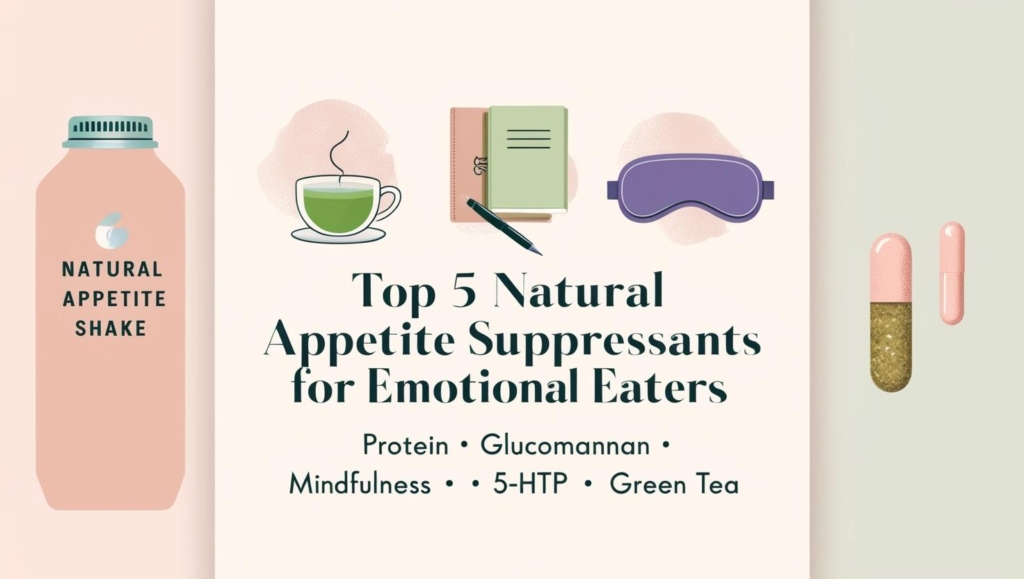Are Your Cravings Emotional or Physical? Here’s How to Tell—And Tame Them for Good
It’s 10:43 PM. You’re not hungry, but you’re reaching for that second slice of cake. Again.
You told yourself you’d stay on track this week. You even prepped your meals, skipped the chips aisle, and started journaling. But then… stress hit. A bad meeting. A tough phone call. Loneliness. And suddenly, food became your refuge again.
Sound familiar?
You’re not alone—and you’re not broken. Emotional eating is real, and it’s more common than you think. The good news? You can regain control. But forget fad pills or willpower hacks. Emotional eaters need more than just a “quick fix”—they need science-backed, long-term appetite suppressants that address the mind and body.
Let’s explore what really works.
🎯 What Makes Emotional Eating So Hard to Beat?

Unlike physical hunger, emotional eating isn’t about nourishing your body—it’s about soothing your feelings. This makes traditional dieting advice useless, or worse, triggering.
Emotional eaters often feel guilty after eating, leading to a cycle of shame → restriction → stress → bingeing again.
To break the cycle, you need tools that nurture emotional regulation and gently suppress appetite without harming your metabolism or mental health.
🧠 Understanding the Science Behind Appetite and Emotions

Appetite is regulated by complex signals—like ghrelin (hunger hormone) and leptin (fullness hormone)—but emotional eaters have heightened sensitivity to dopamine, the brain’s reward chemical.
In simple terms: when you eat comfort food, your brain says “thank you” with a rush of feel-good chemicals. That’s why chips feel like love when life feels like chaos.
So how do you outsmart this built-in reward system without turning food into the enemy?
The answer lies in natural, holistic appetite suppressants that help regulate these responses without numbing your emotions or suppressing your true needs.
🌿 Best Appetite Suppressants for Emotional Eaters (Backed by Research)

1. Protein-Rich Snacks (Especially Casein or Whey Isolate)
- ✅ Why it works: Protein promotes fullness by increasing peptide YY and reducing ghrelin.
- 💡 Pro tip: Sip a protein shake during late-night cravings to help satisfy emotional hunger without triggering guilt.
- 📖 Source: The American Journal of Clinical Nutrition
2. Glucomannan (Konjac Root)
- ✅ A water-soluble fiber that expands in your stomach, making you feel full faster.
- 🎯 Especially helpful before emotionally-triggering meals like family dinners or stressful workdays.
- 📖 Source: International Journal of Obesity
3. Mindful Eating Practices
- 🧘 Slowing down while eating helps rewire your brain’s emotional triggers.
- ✍️ Journaling what you feel before and after eating builds awareness.
- 📖 Source: Harvard Health Publishing
4. 5-HTP (5-Hydroxytryptophan)
- 🌈 Boosts serotonin, improving mood and reducing emotional eating urges.
- 🚫 Not for everyone—check with a healthcare provider if you’re on antidepressants.
- 📖 Source: Appetite Journal
5. Green Tea Extract (EGCG)
- 🟢 A natural thermogenic with mild appetite-suppressing effects and mood support.
- 🫖 Drink between meals for energy + control without caffeine jitters.
- 📖 Source: The Journal of Nutrition
🔍 Real-World Example: From Emotional Binging to Empowered Choices
Priya, a 33-year-old marketing manager and mom of two, used to reach for sweets every evening after putting her kids to bed. She wasn’t hungry—she was exhausted, lonely, and overwhelmed.
Instead of going cold turkey, she made three small shifts:
- Swapped her 9 PM snack with a vanilla whey protein shake.
- Used a 5-minute journaling routine to unpack her emotions.
- Started drinking green tea while prepping her next day’s work plan.
Within three weeks, Priya wasn’t just eating less—she felt more in control. It wasn’t magic. It was mindful, human-centered change.
💬 What NOT to Do When Trying to Suppress Appetite
- ❌ Skip meals (leads to bingeing later)
- ❌ Take random over-the-counter suppressants without research
- ❌ Shame yourself after emotional eating episodes
Instead, pause. Reflect. Rebuild.
🔧 Bonus Tips: Lifestyle “Suppressants” That Work Wonders
- 💤 Prioritize Sleep – Lack of sleep disrupts hunger hormones.
- 🧘♀️ Practice Breathwork – Calms the nervous system and reduces cortisol-driven cravings.
- 🤝 Seek Social Support – Sometimes, the best suppressant is a trusted friend who just listens.
🪞The Bigger Picture: You’re Not Just Controlling Food—You’re Reclaiming Your Power
Cravings are not a sign of weakness. They’re signals—your body and brain trying to cope.
When you approach emotional eating with curiosity and compassion instead of criticism, you shift from survival to self-mastery.
You don’t need to “kill your appetite.” You need to understand it, partner with it, and nourish the real hunger: connection, calm, clarity.
✨ Final Takeaway: Be Kind to Your Cravings—And Be Smarter Than Them
Emotional eating doesn’t make you less disciplined—it makes you human.
So the next time cravings hit, don’t just suppress—listen, learn, and lead yourself through it.
With the right tools, support, and mindset, emotional eating doesn’t have to define you. It can become the doorway to deeper awareness and real healing.
✅ Your Turn: What’s One Habit You’ll Try This Week?
Comment below or tag us on Instagram @Fittrru and share your journey. Whether it’s trying a new tea or journaling before meals, we’re here for every step.
You’ve got this—and we’ve got your back. 💪
📚 Sources & References
- Leidy, H. J. et al. (2007). The American Journal of Clinical Nutrition.
- Birketvedt, G. S. et al. (2005). Int. J. Obesity.
- Harvard Health Publishing – Mindful Eating.
- Rondanelli, M. et al. (2009). Appetite.
- Hursel, R. et al. (2009). The Journal of Nutrition.






